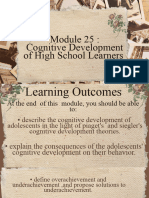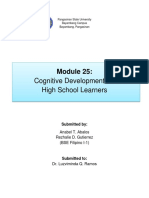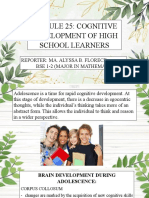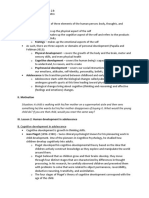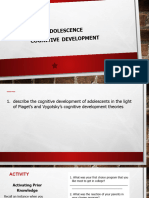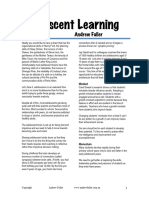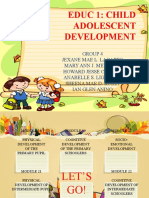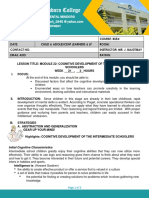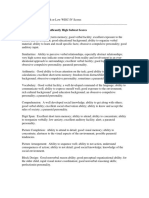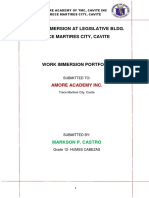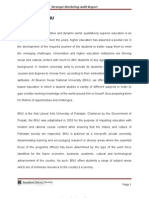Eastern Mindoro College
BONGABONG, ORIENTAL MINDORO
Tel. No. (043)-283-5479; email_1945 @ yahoo.com
COLLEGE DEPARTMENT
NAME: COURSE: BSEd
DATE: CHILD & ADOLESCENT LEARNERS & LP ROOM:
CONTACT NO. INSTRUCTOR: MR. J. MAGTIBAY
EMAIL ADD: RATING:
LESSON TITLE: MODULE 25- COGNITIVE DEVELOPMENT OF HIGH SCHOOL LEARNERS
WEEK 24_ , 3 HOURS
I. FOCUS:
At the end of this module, you should be able to:
• Described the cognitive development of adolescents based on the theories of Piaget and
Siegler’s.
• Explained the consequences of the adolescent’s cognitive development on their behavior.
• Proposed solutions on how to cope underachievement of teens
• Drawn implications of cognitive developmental concepts to high school teaching-learning
and parenting.
II. INTRODUCTION: Adolescence is a time for rapid cognitive development. At this stage, there
is a decrease in egocentric thoughts, while the individuals thinking takes more of an abstract
form. This allows the individual to think and reason in a wider perspective. It is the period of
human development that has great influence on the individual’s future through character and
personality formation.
Changes in thinking patterns are marked by the acquisition of new cognitive skills due to
the brain’s increasing synaptic connections called as corpus collosum. Another brain
development is the process of correlated temporal and parietal areas known as myelination
which covers the brain system whose executive function relates to attention, verbal fluency,
language and planning. Accompanying brain changes in cognitive ability, the adolescent begins
to acquire spatial awareness and formulate abstract or general ideas involving numbers, order
and cause and effect.
III. STRATEGIES
A. ABSTRACTION AND GENERALIZATION
GEAR UP YOUR MIND!
Highlights: COGNITIVE DEVELOPMENT OF HIGH SCHOOL LEARNERS
Piaget’s Formal Operational Thinking
Piaget formulated the theory of Formal Operational Thinking which demonstrates how the cognitive
capacity of the adolescent allows him/her to go beyond the sensible and concrete in order to dwell on
what on what is abstract, hypothetical and possible. Formal operational thinking consists in:
Page 1 of 4
� EMC-SLE: THE CHILD & ADOLESCENT LEARNERS & LEARNING PRINCIPLES
1. Propositional thinking- making assertions outside visual evidence, and stating what may possible
in things not seen by the eyes
2. Relativistic thinking- subjectively making an opinion on facts- involving one’s own bias, prejudice
of distortion of facts- which may be either right or wrong
3. Real vs possible - examining a situation and exploring the possible in terms of situations or
solutions.
For Piaget one indication of the presence of formal operational t conclusion. Thinking is the ability of
the adolescent thinker for combinational analysis. A new capacity known as Hypothetic-Deductive
Reasoning emerges in the adolescent reasoning from general facts/situations to a particular conclusion.
Siegler’s Information Processing Skills
Siegler views the influence of the environment on thinking. He sees cognitive growth, not a stage of
development, but more of sequential acquisition of specific knowledge and strategies for problem solving.
He observes the quality of information the adolescence process that influence him/her in facing tasks at
hand though strategies or rules. Siegler’s experiment shows that adolescents may have: a) speed in
information processing, b). Complexity by way of considering longer-term implications, and c) increased
volume of information processing.
Metacognition
Among the cognitive advances in adolescence is metacognition- the ability to identify one’s own
thinking process and strategies inclusive of perception, memory, understanding, application, analysis,
assessment and innovation. Another important development is the ability of the adolescent for
information processing - sequential acquisition of specific knowledge and strategies for problem
solving. Withdrawn underachievers refer to those who have a more pronounced tendency to be passive
resulting in being submissive and docile. Generally quiet they do not participate in class activities.
Aggressive underachievers are those who tend to be talkative, disruptive and rebellious.
Overachievement
The case of overachievers is a reminder that the Intelligence Quotient test is not the only determinant in
school achievement. There are other factors such as motivation interest, work habits, and personality
development. The overachieving adolescent may demonstrate superior work habits, greater interest in
school work, consistent in doing assignments, and performance conscious. They show more
responsibility.
Characteristics of overachievers:
1. positive self-value (self-esteem, confidence, optimism)
2. openness to authority (responsive to expectations of parents and teachers)
3. positive interpersonal relations (responsive and sensitive to others’ feelings)
4. less conflict on the issue of self-autonomy (feels freedom to make right choices, initiates and leads
activities).
5. academic orientation (disciplined work habits, high motivation to discover and learn)
6. goal orientation (efficiency and energy in organizing, planning and setting target)
7. control over anxiety
Underachievement
The adolescent may perform below the standards set. Possible potentials do not come up with the
opportunity to learn. Grades are below measured aptitudes for academic achievement. Withdrawn
underachievers refer to those who have more pronounced tendency to be passive resulting in being
2
� EMC-SLE: THE CHILD & ADOLESCENT LEARNERS & LEARNING PRINCIPLES
submissive and docile. They follow the path of no resistance, not reacting to given assignments. They are
generally quiet, do not participate in class activities. Aggressive underachievers are those who tend to
be talkative. disruptive and rebellious.
Behavior and Adolescent Cognitive Growth
There are behavioral tendencies which may accompany cognitive growth during adolescence:
1. Egocentrism - the adolescence’s tendency to think too much of themselves, while being too
sensitive to social acceptance of their appearance, actions, feelings and ideas.
2. Idealism - this refers to imagining the far-fetched and less ideal situations at home, in school, and
in society. The teen may imagine a utopia or heaven on earth leading to discouragement when
social realities become harsh. Like low grade.
3. Increased argumentativeness - teens enjoy learning through the use of group dynamics including
role play, discussion, debate, and drama.
Implications to adolescent care, education and parenting
Parents and teachers must be able to recognize the cognitive development among adolescents and
create situation that will foster higher thinking skills through:
1. Activities at home (asking teenage for suggestions on family matters)
2. Allowing more independence (use of school allowance, choice on what to wear) 3. Activities in
school that allow participation (field trips, joint group research)
4. Develop reading skills through magazine articles.
Developing Occupational Skills
John Holland has identified basic personality factors that much with attitude and work preferences:
1. Realistic - prefers practical task including those requiring physical labor4 and motor coordination,
and less interpersonal skills
2. Investigative - prefers tasks that are conceptual such as in the field of science and technology
3. Conventional - prefers structured tasks that cater to the needs of others
4. Enterprising - prefers independence and innovating in business and other enterprises that reflect
autonomy and personal initiative
5. Artistic - prefers unstructured tasks that show ability for self-expression
Adolescence may show for gainful work like:
1. self-reliance (working independently)
2. money management (not spending money on luxuries)
3. social responsibility (cooperation and respect for others)
4. mature work orientation (pride in work and quality of work)
5. personal responsibility (assuming tasks independently and competitively)
6. positive attitude toward work (work is seen as gainful not a burden)
B. APPLICATION / ANALYSIS
1. Describe the cognitive development of adolescence based on Piaget and Siegler’s
_________________________________________________________________
_________________________________________________________________
_________________________________________________________________
3
� EMC-SLE: THE CHILD & ADOLESCENT LEARNERS & LEARNING PRINCIPLES
_________________________________________________________________
_________________________________________________________________
2. What solutions can you give to underachievers performance in school?
________________________________________________________________________
________________________________________________________________________
________________________________________________________________________
________________________________________________________________________
________________________________________________________________________
3. Cite implications on the cognitive concepts to teachers teaching adolescence and parenting.
________________________________________________________________________
________________________________________________________________________
________________________________________________________________________
________________________________________________________________________
________________________________________________________________________
________________________________________________________________________
4. As a future teacher, what responses do you think can be made by parents or teachers for
varied types of cognitive achievement patterns (you may ask your parents)
Types of achievement patterns Responses either by teacher or parent
1. For overachievers and further
inducement to self-value, goal
orientation, positive interrelations
2. Underachievers and
parental/teacher encouragement and
support
3. Aggressive underachievers who tend to
be disruptive, if not rebellious
4. Egocentrism and over-sensitivity to social
acceptance
5. Idealism and adolescents being possibly
discouraged by painful realities of life e.g.
Conflicts at home, challenges in school
work, etc.
Prepared by:
MR. JAYMAR B. MAGTIBAY
Instructor 4



